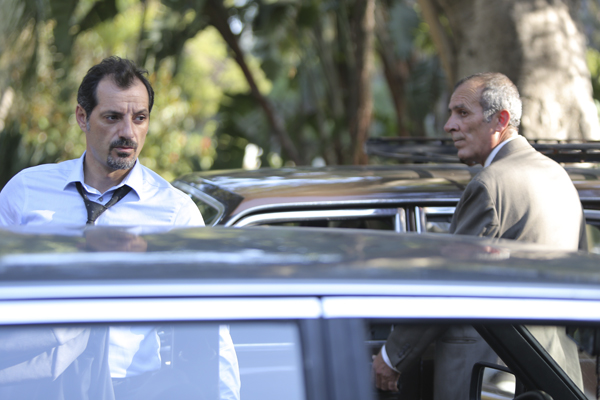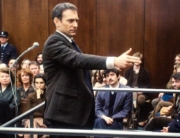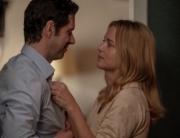In Lebanese director Ziad Doueiri’s The Insult, two men’s ill-tempered argument over a broken drainpipe leads to a hurled curse, a savage punch, a vendetta, a courtroom showdown, and finally to urban battles that come close to setting Lebanon on fire. Along the way, families quarrel among themselves, and antagonists hearken back to bygone blood feuds. The trivial incident that sets off the conflict hides the real cause: stubborn male arrogance. How much macho is too much macho? In this film, too much to let old wounds heal until a great deal of damage has been done.
Muscled, goateed Lebanese Christian Tony (Adel Karam) and his much younger wife are expecting a baby. Palestinian construction foreman Yasser (Kamel El Basha) confronts Tony when water drops on his head from Tony’s balcony. Yasser’s attempt to install a new pipe ends in Tony’s theatrically smashing the unwanted hardware with a hammer. Simmering with rage, the two men meet later in front of Tony’s auto garage. Tony’s truly spiteful insult, which is political as well personal, snaps Yasser’s self-control, and the quieter man levels Tony with two broken ribs. Soon, neighbors take sides in the battle, and not one but two trials try to determine who owes who an apology.
Cooler, smarter heads than Tony and Yasser try to calm the antagonists down (the two men’s wives exist onscreen mostly to beg them to cool off), but others see opportunity in the beef. As the story line heads into a drawn-out courtroom drama section, Tony’s old-hand attorney (Camille Salameh) works his trial skills and pours oily rhetoric on Lebanon’s charged political situation, asking the jury, “Are Palestinians the only ones who have suffered?” An untried young woman defends Yasser, all the while hiding a relationship to the older lawyer that comes to light in one of the hothouse drama’s stagier turns. In the courtroom, partisans jeer at each other across the aisle, before taking to Lebanon’s streets with bottles and rocks. Even the country’s president begs Yasser and Tony to drop the quarrel. The decision that brings the conflict to an end arrives with a real-life sense of deflation. Is the argument really over?
The Insult alludes to decades of Lebanese conflict. Tony and Yasser’s antagonism has roots in Lebanon’s gradual absorption of Palestinian refugees, who, as depicted here, are generally resented by the country’s Christians. Tony’s own childhood memories are wrapped up in a violent episode from Lebanon’s civil war. Old grudges are hashed out in the courtroom, in family settings, and in Beirut’s alleys and rooftops. Tony can’t resist watching grainy speeches on TV by Bachir Gemayel, a militiaman and politician assassinated in 1982, which tells you how ready he and his community are to move on.
Actors Karam and El Basha ably fill the roles of flawed characters, with the preening, perpetually pissed-off Tony a particularly hard one to embrace, and the cinematography suffuses Beirut’s careworn cityscape with warm golden light. This battered city harbors a morass of grievances that no one can seem to forget, and although the film has energy and verve, it too gets bogged down in the two angry men’s old hatreds.







Leave A Comment